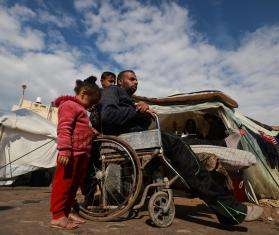Nairobi, August 19, 1998 — Displaced children in the famine-stricken area of Panthou in Bahr el Ghazal, southern Sudan, are at extreme risk of death, a new Doctors Without Borders/Médecins Sans Frontières (known internationally as MSF) nutritional and mortality survey reports. According to the assessment, displaced children in Panthou are almost 17 times more likely to die of starvation or starvation-related illnesses than resident children from the area, despite the fact that the levels of malnutrition within the two groups are similar.
The mortality and nutritional survey reports a death rate of 43.8 deaths per 10,000 people per day for displaced children under the age of five versus 2.6 deaths per 10,000 people per day for resident children under the age of five. The overall level of malnutrition among children under the age of five in Panthou is 53.4%.
"Usually malnutrition rates are good indicators of the risk of death, but in Panthou there are obviously other factors which are contributing to the high mortality rate among the displaced. This survey shows just how much more vulnerable displaced people are. They have limited access to shelter, and no or few family members around, and they are often exhausted after walking for days before reaching our centers," says Stephanie Maxwell, medical coordinator of MSF's relief programs in Panthou.
In order to prevent further displacement to Panthou, MSF is now planning to open feeding centers both in Ajac and Tieraliet -- the two locations from which most of the displaced in Panthou have come.
Approximately 14,000 people reside in Panthou, 43.9% of whom are displaced. Of the total population, 29.2% are children under the age of five. MSF has admitted the 100 most severely malnourished children to its therapeutic feeding center (supervised wet meals eight times a day) in Panthou, and approximately 2,000 to its supplementary feeding center (dry food to take home, once a week). The organization will start a so-called modified therapeutic feeding center in the next couple of weeks, for some 1,000 severely malnourished children. There, the children will receive 2 supervised meals a day plus rations of dry food to take home.
"We admit 50 new children every day to the supplementary feeding center. The problem is that up to 250 new people line up every day -- most of whom fit the admission criteria -- but at present our capacity is insufficient. Only the most malnourished can be admitted. To select the 50 who'll get food is one of the most emotionally draining tasks imaginable. Everybody hates that job," says Stephanie Maxwell.
In addition to food, the children receive Vitamin A, measles vaccinations, de-worming medication, malaria treatment and prophylaxis, and ferrous sulphate as many children are anemic. All children in the therapeutic feeding center (and the modified therapeutic center when operational) also receive a dose of antibiotics when admitted.
"In terms of infectious diseases, we are doing everything we can to prevent cholera, dysentery, and measles. We are already preparing for a possible cholera outbreak by having a cholera treatment kit transported from Nairobi to Lokichokio, just in case. At this point, though, respiratory infections pose the greatest risks of death to the children, says Stephanie Maxwell.
MSF is currently running 12 supplementary and intensive feeding centres for around 12,000 children in nine locations in Bahr El Gazhal. The number of children needing to be admitted continues to increase and MSF estimates that by the end of August around 20,000 children will be going through their feeding centres.



